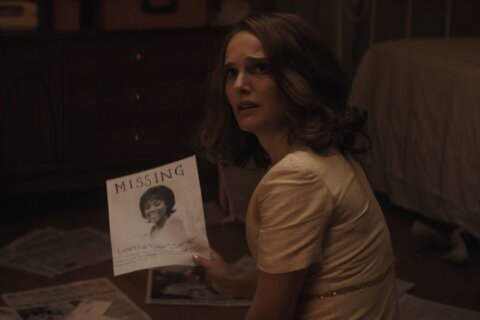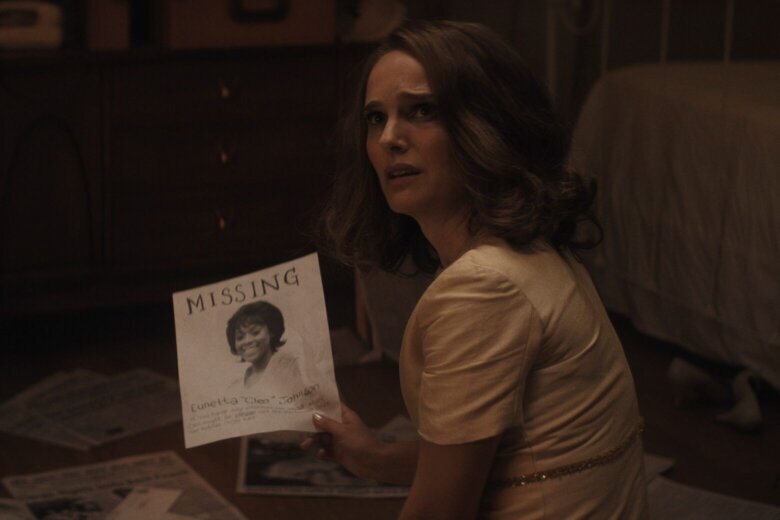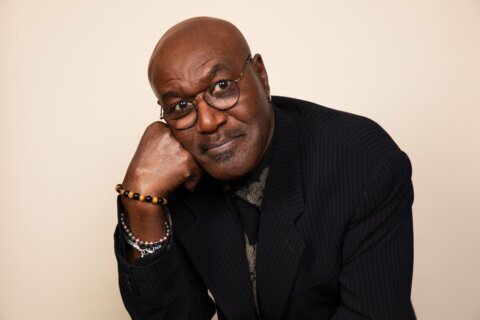Exactly a month after “Presumed Innocent” rendered its verdict, Apple TV+ solves another murder mystery.

“Lady in the Lake” drops its seventh and final episode on Thursday, finishing with a strong splash after treading water early on to the point of nearly drowning. Glad I kept paddling.
Despite the title, this series has nothing to do with M. Night Shyamalan, Arthurian legend, nor the 1947 film-noir adaptation of Raymond Chandler’s 1943 novel by Robert Montgomery, who directed himself as the iconic Det. Philip Marlowe a year after Bogie in “The Big Sleep.” As my L.A. film critic pal Oliver Jones (son of legendary D.C. movie critic Davey-Marlin Jones) quipped on the Arch Campbell Podcast: “Different lady, different lake.”
This time, “Lady in the Lake” is based on the 2019 novel by Laura Lippman, graduate of Wilde Lake High School in Columbia, Maryland, who based the story on a pair of 1969 Baltimore murders she discovered working at The Baltimore Sun: an 11-year-old Jewish girl, Esther Lebowitz, and a 33-year-old Black woman, Shirley Parker.
In this fictional TV version, the young Jewish victim is named Tessie Durst (Bianca Belle) and the endangered Black woman is Cleo Johnson (Moses Ingram). The former’s disappearance may have something to do with the latter, both investigated by aspiring journalist Maddie Schwartz (Natalie Portman), who is eager to escape her abusive marriage in Pikesville to find a new apartment in the city and a new career at The Baltimore Star.
“Lady in the Lake” is billed as the first TV role for big-screen movie star Natalie Portman, who burst onto the scene as a child actor in “Leon: The Professional” (1994), “Heat” (1995) and “Beautiful Girls” (1996). Her role as Padmé Amidala in the “Star Wars” prequels (1999-2005) proved her box-office potential, “Closer” (2004) made her an Oscar nominee and “Black Swan” (2010) deservedly won her an Oscar in one of the best films of the 21st century.
However, ever since her third nomination for “Jackie” (2016), Portman’s career has sidetracked into bombastic “Thor” sequels and unwatchable Terrence Malick tone poems. Her Golden Globe nomination for Best Actress (Comedy/Musical) was puzzling because there was nothing funny about “May December” (2023), though her sultry interview scenes paint a similar identity crisis in “Lady in the Lake” with overly breathless line deliveries.
Emmy nominee Moses Ingram (“The Queen’s Gambit”) is more authentic as Cleo, perhaps because she’s actually a Baltimore native, delivering a standout performance alongside Jennifer Mogbock as drug-addicted nightclub singer Dora Carter. Wood Harris also shines as crime kingpin Shell Gordon, a Baltimore gangster similar to his Avon Barksdale in “The Wire” (2002), this time with the business sense of Stringer Bell as he runs a gambling ring.
Harris reunites with “Remember the Titans” (2000) director Boaz Yakin, who pens the pivotal Episode 5 and the conclusive Episode 7. The rest is helmed by Briana Belser, Nambi E. Kelley, Sheila Wilson and showrunner Alma Har’el, who also directs all seven chapters after winning the Directors Guild of America’s First-Time Feature Award for “Honey Boy” (2019) directly following Bo Burnham (“Eighth Grade”) and Jordan Peele (“Get Out”).
While her direction is once again dynamic, her writing starts off surprisingly confusing in the first two episodes. The pilot hints at “beyond the grave” narration that doesn’t work as well as the watery demise in “Sunset Blvd.” (1950), and while this is ultimately forgiven, it’s initially hard to follow with two different lake murders. You’ll wonder whether Durst’s pet-shop kidnapping is a flashback of Maddie’s childhood, only to realize it’s not.
Behind the camera, Har’el is still a force with fish-tank imagery providing clever foreshadowing. She beautifully captures 1960s Charm City with delicious period design, from Thanksgiving Day parades to snow falling outside Hecht’s storefronts where Cleo models colorful clothes in the window. When a character says, “I left Baltimore not knowing that soon after it would be stripped down,” audiences feel the pain because we love this atmosphere.
Thus, the series has a lot to say about postwar racism, drawing parallels between the oppression of Blacks and Jews. Maddie is shunned for an interracial romance with a Black cop (Y’lan Noel), who must enter her window rather than the front door. Maddie’s editor refuses to run Black stories and laments a female reporter in his male-dominated newsroom, stealing her byline and leaving her a “contribution” credit at the bottom of the article.
These themes carry the series across all seven episodes, even when dream sequences threaten to overshadow the plot. Like Tony Soprano’s nightmares in “The Sopranos,” these hallucinatory sequences are brilliantly directed with creative manifestations of the protagonist’s subconscious, but they provide one too many clues. Along the way, Marcus Norris’ music jolts with jumpscares and intends to creep us out with a whistling tune like “Kill Bill” (2003).
Maybe it’s whistling across a watery graveyard to set a crime tale in Baltimore where Omar’s whistle is still so beloved. If you come at the king, you best not miss, but it’s unfair to compare “Lady in the Lake” to “The Wire.” I kept comparing it to a superior Baltimore murder mystery in the Netflix docuseries “The Keepers” (2017), also seven episodes, also about a 1969 murder, but way more chilling. Stream that before dipping your toe in here.
Get breaking news and daily headlines delivered to your email inbox by signing up here.
© 2024 WTOP. All Rights Reserved. This website is not intended for users located within the European Economic Area.









